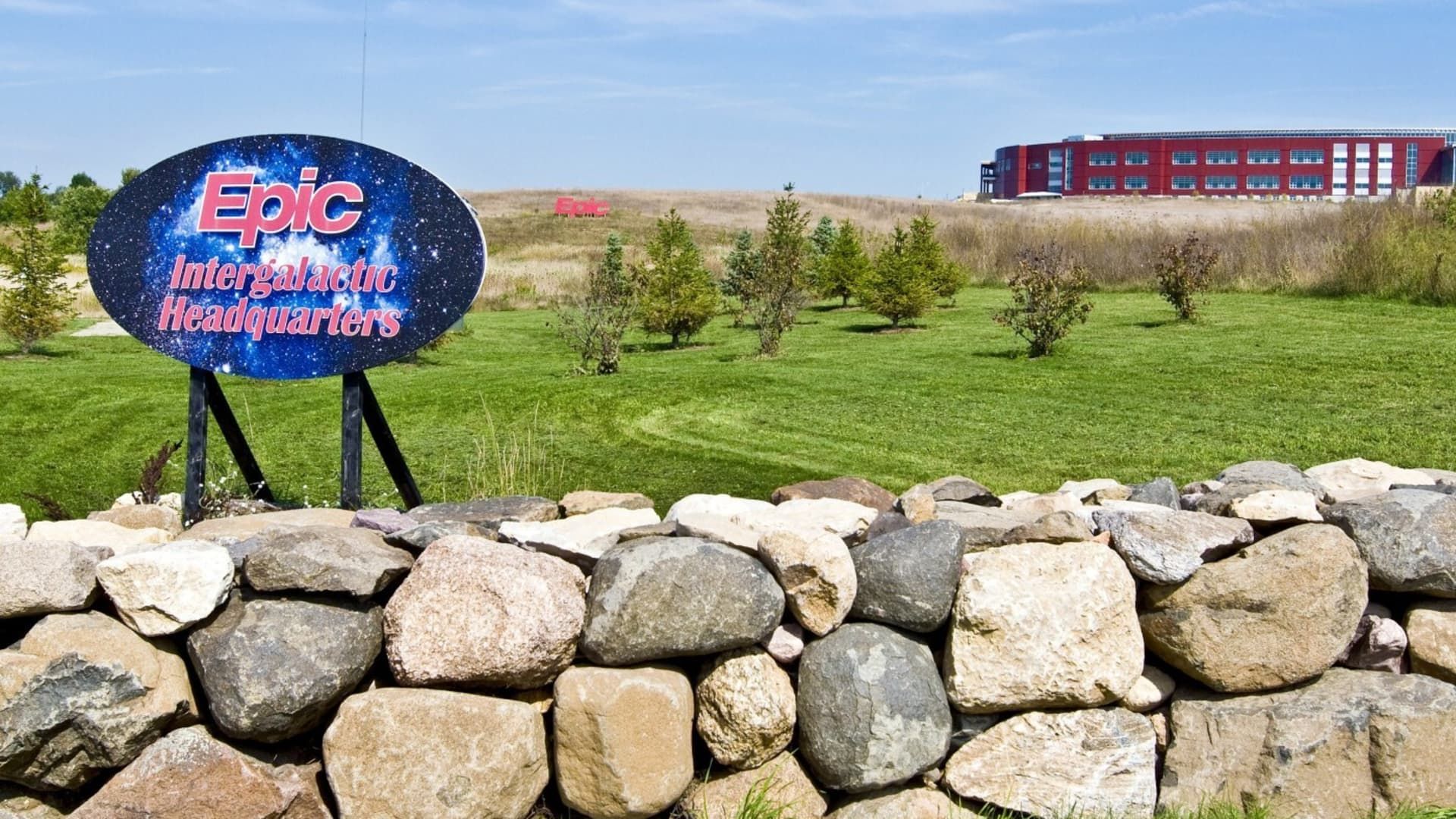A sign that says “Epic Intergalactic Headquarters” on campus.
Epic Systems
Dorothy Gale was right: the Land of Oz is not in Kansas, but in the rolling green fields of Verona, Wisconsin, a city of nearly 16,400 people located about 10 miles southwest of the capital, Madison.
Verona is home to the extravagant, sprawling 1,600-acre headquarters of Epic Systems, one of America’s largest private technology companies. Epic’s software appears to be present in every hospital and clinic, and stores the medical records of more than 280 million people in the United States.
While the company’s workforce has the heavy responsibility of building tools to support doctors and nurses as they provide care to patients, Epic employees spend their days walking in and out of offices that look like they’re pulled straight from the pages of a science fiction novel or children’s book.
A yellow brick road inspired by “The Wizard of Oz” winds through the halls of a gleaming emerald green building. Giant chocolate chips mark the entrance to the chocolate factory, and a mischievous cat smiles through the window of a building guarded by life-size playing cards.
The Oz office building on the Epic campus.
Courtesy: Epic Systems
Last week, thousands of healthcare executives flocked to Epic’s sprawling campus for the company’s annual user group meeting, in part to learn about new products and upcoming initiatives. This year’s theme was “story time,” and Judy Faulkner, the company’s 81-year-old chief executive, took the stage dressed as a swan, a plume of feathers in her hair.
Faulkner, a reserved mathematician who founded Epic in a basement in 1979, told the crowd that the surrounding buildings and their upkeep account for 8 percent of the company’s total expenses. But she stressed the obvious: It is much cheaper for Epic to buy land and build in Verona than in a tech hub like San Francisco, Seattle or New York. And in this small Midwestern town, the company is far from the distractions of big cities.
“Most of us in software development are active readers of science fiction,” Faulkner said during his keynote address.
The campus of the Wizard Academy.
Courtesy: Epic Systems
For public market investors, Epic has always been something of a fantasy.
The company, with a staff of 14,000, does not follow a set budget, has made no acquisitions and has never accepted any venture capital investment. It is governed by its own Ten Commandments, according to its website, the first of which is “do not go public.”
Epic generated revenue of $4.9 billion last year. Cerner, Epic's main rival in the electronic medical records market, went public in 1986 and was acquired by Oracle in 2022 for more than $28 billion. According to Oracle financial data, Cerner contributed $5.9 billion in revenue in fiscal year 2023.
The S&P 500’s software and services subindex trades at 9 times revenue. On average, that would give Epic a valuation of about $45 billion.
Faulkner is not interested in a result like Cerner's. After all, the second commandment of the epic is “do not let yourself be acquired.”
“Why be owned by people whose primary interest is the return of capital?” Faulkner asked on stage last week.
Walking around Epic's campus, it's clear that the company exists in a universe far removed from Wall Street.
Each of Epic’s 28 office buildings has a theme. They’re grouped into mini-campuses, with names like Prairie Campus, Farm Campus, Central Park Campus, Wizards Academy Campus and Storybook Campus. The buildings have become more ornate over the years, forcing some haggling with architects, according to Epic’s website.
The conference room chairs match the intricate themes of their buildings. And while it’s fun to look at the campus’ dinosaurs, suits of armor and working carousel, they also serve a purpose. Faulkner says his plan was to create a pleasant environment that could attract and inspire talent and ensure his employees had the quiet space they needed to be productive, according to a series of testimonials on Epic’s website.
“We compete with the big tech companies,” Faulkner said in testimony. “These attributes help us hire the best people possible. That helps us be more productive.”
An aerial view of the Epic campus.
Epic Systems
Faulkner says individual offices should be available for all employees who want one. Since the vast majority of the company's employees commute to headquarters every day, some people have to work in them separately, as hiring often outstrips work.
Those who want to escape the office altogether can hop on one of the company's 600 cowhide-print bicycles to attend meetings from a treehouse, slide down a rabbit hole or eat lunch in a train car.
An underground universe
Epic's address offers the first clue to its underworld existence. The company is located at 1979 Milky Way, a nod to the date of its creation and Faulkner's affinity for celestial themes.
Visitors are greeted by a sign reading “Epic Intergalactic Headquarters” as they drive down a road that winds between buildings and vast green fields. About 750 acres of Epic’s campus is active farmland dotted with 42 sheep, 14 cows and a donkey.
Most of the company's parking lots are underground, which helps the campus maintain an impressive feel from above. It also means employees don't have to worry about removing snow or ice from their cars during the harsh Midwestern winter.
Even when they're not parking, workers are no strangers to the underground. Campus buildings are connected through a network of tunnels and enclosed walkways, so people don't have to go outside to travel between them.
The exterior of Epic's Deep Space auditorium.
Courtesy: Epic Systems
Employees are also required to attend a monthly staff meeting in an underground auditorium called Deep Space. Meetings last about two hours and employees present projects and discuss industry trends.
“They always include a grammar lesson,” Faulkner said at the users' group meeting in the auditorium, which opened in 2013 and seats about 11,400. The room is a feat of engineering, with no columns supporting it.
To reach Deep Space, visitors must descend through Earth levels. The different levels of the building are named Sky, Grass, Earth, Rock, Magma and Core. The lobby outside the auditorium is inspired by the Lord of the Rings series, and the word “precious” is ominously scrawled on the wall in giant, bright red letters.
Sci-fi references are everywhere. There's a coffee shop called 42, which is the answer to the question about life, the universe and everything from the “Hitchhiker's Guide to the Galaxy.” The Wizarding Academy campus is clearly inspired by “Harry Potter,” and has its own King's Cross train station, a giant chess set and a collection of rebel portraits.
Epic is building a new campus on the same land inspired by epic fantasies like “Game of Thrones” and “Star Wars.” Cranes were decorated with giant comets that soared above the campus during last week's event.
Epic's Treehouse on Endor.
Courtesy: Epic Systems
While each office building has its own theme, the skeleton of the physical structures is very similar. Long office hallways are punctuated by the occasional conference room, and most buildings are no higher than three stories — a design choice Faulkner says is meant to promote in-person meetings.
Home to Epic's oldest offices, the Prairie Campus features buildings named after celestial bodies such as stars, planets and galaxies.
At Storybook Campus, the building called Mystery looks like an old mansion, where one could easily imagine Sherlock Holmes wandering the halls. The Castaway building resembles a ship, and its interior is filled with nautical decor.
The walls of many of the buildings are decorated from floor to ceiling. Art objects, ceramics, mosaics and paintings by local artists are displayed in every corner.
A snowy day on Epic's campus.
Epic Systems
Walking around the grounds during the user group meeting, it was easy to forget that Epic is a software company.
Outside of its fantasy campus, however, medical professionals and their patients have very real needs from this giant technology provider, and there are many very real critics.
For years, Epic has been accused of delaying interoperability efforts that would help streamline the exchange of patient information between providers.
Historically, healthcare data in the U.S. has been siloed and difficult to move, as clinics, hospitals, and health systems may store their information in a variety of formats across dozens of different vendors. Data is also protected by federal laws such as the Health Insurance Portability and Accountability Act (HIPAA).
Oracle, now Epic's chief rival, claims that Epic is fiercely protective of its turf. In a May blog post, Oracle executive vice president Ken Glueck wrote that “everyone in the industry understands that Epic CEO Judy Faulkner is the biggest obstacle to electronic medical records interoperability.”
Lately, Epic has been helping the federal government set up a data-sharing network called the Trusted Exchange Framework and Common Agreement (TEFCA), which aims to address the legal and technical requirements for sharing patient data on a large scale. Epic said last month that it plans to move all of its customers to TEFCA by the end of next year.
But the company still plans to use its extensive homegrown network. At its user group meeting, Epic announced a number of new generative AI features for its Cosmos platform, which is a set of anonymized patient data that doctors can use to support treatment and conduct research.
Epic’s senior vice president of research and development, Seth Hain, spoke to reporters after the keynote in a hut-like meeting room. Hain had just presented a demo to the audience in which an AI agent assessed his recovery after a supposed wrist surgery by comparing data from Cosmos.
He said such tools could be ready within a few years.
“Technology is progressing very rapidly,” Hain said.
LOOK: Artificial intelligence revolutionizes the field of medical records












